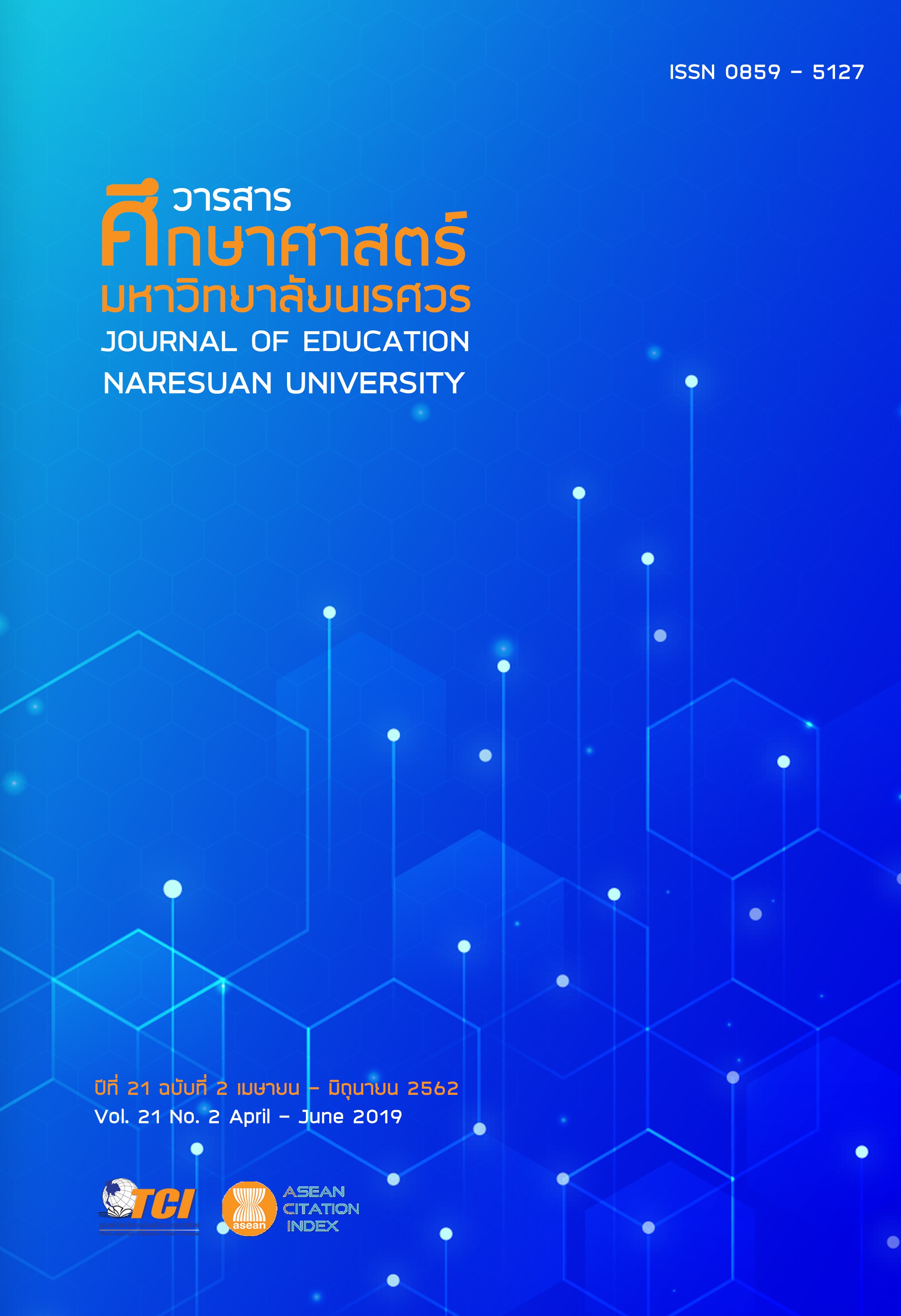การอำนวยการวาทกรรมชั้นเรียนเพื่อพัฒนายุทธวิธีการเรียนรู้โดยการกำกับตนเอง ของนักเรียนในชั้นเรียนคณิตศาสตร์ที่เน้นการแก้ปัญหา (FACILITATING CLASSROOM DISCOURSE FOR DEVELOPING SELF-REGULATED LEARNING STRATEGIES OF STUDENTS IN A PROBLEM-SOLVING MATHEMATICS CLASSROOM)
Main Article Content
Abstract
การวิจัยนี้มีวัตถุประสงค์เพื่อศึกษาแนวทางการอำนวยการวาทกรรมชั้นเรียนเพื่อพัฒนายุทธวิธีการเรียนรู้โดยการกำกับตนเองของนักเรียนในชั้นเรียนคณิตศาสตร์ที่เน้นการแก้ปัญหา งานวิจัยนี้ใช้ระเบียบวิธีวิจัยเชิงคุณภาพ กลุ่มเป้าหมายในการวิจัย คือ นักเรียนชั้นมัธยมศึกษาปีที่ 2 จำนวน 40 คน ของโรงเรียนสาธิตมหาวิทยาลัยเชียงใหม่ ปีการศึกษา 2559 เครื่องมือวิจัยประกอบด้วย แผนการจัดการเรียนรู้ ใบกิจกรรม แบบสังเกตชั้นเรียน แบบบันทึกหลังการสอน แบบสัมภาษณ์นักเรียน และการบันทึกวีดิทัศน์ โดยผู้วิจัยใช้การวิเคราะห์โพรโทคอลชั้นเรียนร่วมกับการวิเคราะห์ผลงานการแก้ปัญหาของนักเรียนและนำเสนอข้อมูล โดยการพรรณนาวิเคราะห์ ผลการวิจัย พบว่า ในชั้นเรียนคณิตศาสตร์ที่เน้นการแก้ปัญหาตามแนวทางของวิธีการแบบเปิดมีแนวทางการอำนวยการวาทกรรมชั้นเรียน ซึ่งครูและนักเรียนได้ปฏิบัติเพื่อพัฒนายุทธวิธีการเรียนรู้โดยการกำกับตนเองของนักเรียนในแต่ละระยะของวงจรการเรียนรู้ ได้แก่ การคาดการณ์แนวคิด การคอยกำกับติดตามแนวคิด การเลือกแนวคิด การเรียงลำดับแนวคิด และการเชื่อมโยงแนวคิด โดยในระยะการคิดล่วงหน้า นักเรียนสามารถบอกเป้าหมายในการทำโจทย์ และวางแผนเลือกวิธีการที่ใช้ในการทำโจทย์ได้ สำหรับระยะการแสดงออก นักเรียนสามารถเขียนแสดงขั้นตอนในการทำโจทย์ได้ และมีการจดบันทึกสิ่งที่เรียนรู้จากการทำโจทย์ สุดท้ายระยะการสะท้อนด้วยตนเอง นักเรียนมีการตรวจสอบคำตอบ และบอกได้ถึงข้อดีและข้อเสียของวิธีการที่นำมาใช้ในการแก้ปัญหา
FACILITATING CLASSROOM DISCOURSE FOR DEVELOPING SELF-REGULATED LEARNING STRATEGIES OF STUDENTS IN A PROBLEM-SOLVING MATHEMATICS CLASSROOM
The purpose of the present research was to study the guiding principles of facilitating classroom discourse to develop the self-regulated learning strategies of students in problem-solving mathematics classroom. This research uses qualitative research methodology. The research target group consisted of 40 grade 8 students at Chiang Mai University Demonstration School in academic year 2016. Research tools include: lesson plans, activity sheet, classroom observation, teacher self-reflections, student interview form, and video recordings. The researcher analyzed classroom protocol analysis combined with analysis work piece to solve student problems and present the data by descriptive analysis. The research found that in problem-solving mathematics classroom follow the guidelines of the open approach. There is a guiding principle of facilitating classroom discourse that teachers and students practice to develop the self-regulated learning strategies of students in each phase of the learning cycle include Anticipating, Monitoring, Selecting, Sequencing, and Connecting. By the stage of forethought phase, Students can tell their goals. And plan to choose the method used to solve the problem. For performance phase, Students can write a step-by-step procedure, and there is a record of what is learned from the solution. Last Self-reflection phase, Students are checking the answers, and tell the pros and cons of the methods used to solve the problem.
Article Details
The owner of the article does not copy or violate any of its copyright. If any copyright infringement occurs or prosecution, in any case, the Editorial Board is not involved in all the rights to the owner of the article to be performed.
References
In F.K. Lester, Jr. (Ed.), Research and issue in teaching mathematics through problem solving (pp. 241-254). Reston, VA: National Council of Teachers of Mathematics.
2. Inprasitha, M. (2010). One feature of adaptive lesson study in Thailand: Designing a learning unit. Proceedings of the 45th Korean National Meeting of Mathematics Education (pp. 193-206). Gyeongju: Dongkook University.
3. Inprasitha, M. (2014). Problem-solving processes in school mathematics. Khon Kaen: Pen Printing Company. [in Thai]
4. Lester, Jr. (2011). The role of problem solving in the secondary school mathematics classroom. Teaching and Learning Mathematics, 7-12.
5. Ministry of Education. (2008). The Basic Education Core Curriculum B.E. 2551 (A.D. 2008). Bangkok: The Agricultural Cooperative Federation of Thailand. [in Thai]
6. Phairotphiriyakun, N., Lindratanasirikul, K., and Chantarasonthi, U. (2013). The effects of mathematics learning activities in the topic of sequences and series with the use of open–ended mathematics problems on mathematics learning achievement and problem solving ability of Mathayom Suksa V at Tessabanphetcharawit School in Tak Province. Journal of Education Naresuan University, 15(1), 7-16. [in Thai]
7. Panich, W. (2012). How to create learning to disciple in the 21st century. Bangkok: Sodsri-Saridwongso Foundation. [in Thai]
8. Schoenfeld, A. H. (1985). Mathematical problem solving. Orlando, FL: Academic Press.
9. Smith, M. S., & Stein, M. K. (2011). 5 Practices for orchestrating productive math discussions. Reston, VA: National Council of Teachers of Mathematics.
10. Stein, C. C. (2007). Let's talk: Promoting mathematical discourse in the classroom. Mathematics Teacher, 101(4), 285-289.
11. Suttiamporn, W. (2015). Mathematical activity emphasized on connection among knowledge and ideas for fostering students’ creativity. Journal of Education Naresuan University, 16(4), 93-103. [in Thai]
12. Zimmerman, B. J. (1989). A social cognitive view of self-regulated academic learning. Journal of educational psychology, 81(3), 329-339.
13. Zimmerman, B. J. (2002). Becoming a self-regulated learner: An overview. Theory into practice, 41(2), 64-70.


